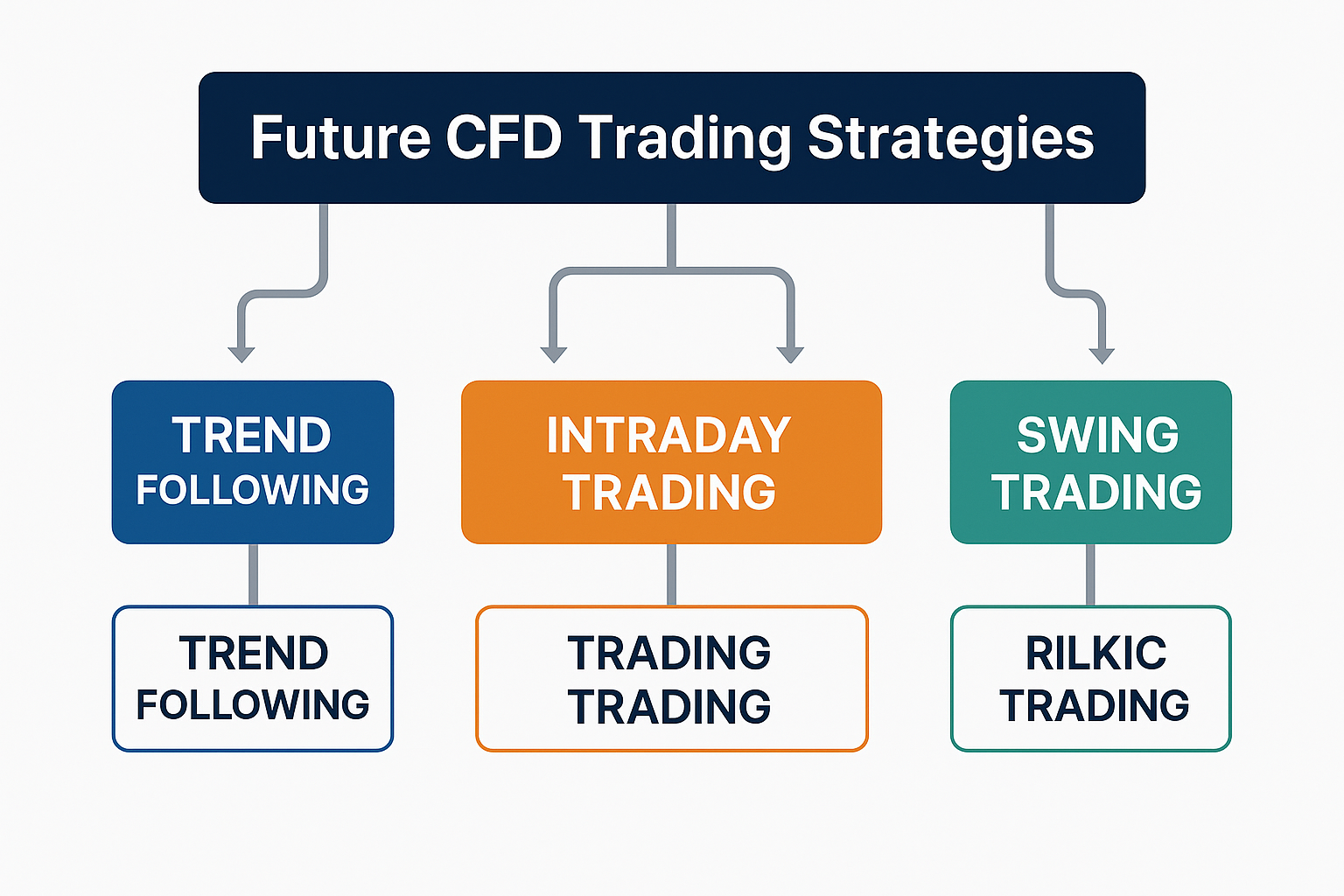
What Is a Future CFD?
Key Characteristics of Future CFDs
A Future CFD (Contract for Difference) is a financial derivative that allows traders to speculate on the future price movements of an asset—such as indices, commodities, or currencies—without owning the underlying asset or entering a traditional futures contract. Unlike standard CFDs, Future CFDs are tied to the price and expiry structure of futures contracts, offering a unique blend of leveraged exposure and structured trading.
Key features of Future CFDs:
- Leverage: Amplifies gains and losses
- Expiry: Tracks the expiration date of underlying futures
- No Ownership: No physical delivery of the asset
- Cash-Settled: Settled based on price differences
Future CFDs vs. Traditional Futures
| Feature | Future CFDs | Traditional Futures |
| Ownership | No | No |
| Expiry | Yes (mirrors underlying futures) | Yes |
| Margin Requirements | Lower | Higher |
| Exchange-Traded | No (OTC) | Yes |
| Flexibility | Higher | Lower |
| Hedging Use | Suitable | Preferred by institutions |
How Does Future CFD Trading Work?
Leverage, Margin, and Costs
Future CFDs are leveraged instruments, meaning traders only deposit a margin—often 5–20% of the total contract value—to open positions. While this boosts capital efficiency, it also increases exposure to market movements. Costs may include:
- Spread (Bid-Ask difference)
- Overnight financing (swap fees)
- Commission (in some cases)
Trading Mechanics and Expiry
These CFDs track the futures market of the underlying asset, including its expiry. Positions are usually auto-closed or rolled over at contract expiration. Unlike rolling CFDs, you cannot hold Future CFDs indefinitely, making timing crucial.
CFDs vs Futures: Key Differences
Regulation and Access
Futures are traded on regulated exchanges like CME or ICE, whereas CFDs are OTC (Over-the-Counter) instruments offered by brokers. CFD trading access varies by region and broker, while futures require exchange access.
Contract Size and Expiry
Futures contracts are standardized with fixed lot sizes, which can be large and costly. CFDs offer flexible position sizing and are better suited to retail traders.
Costs and Trading Hours
Futures may have exchange fees and broader spreads during off-peak hours. CFDs often have tighter spreads and extended trading hours but may charge overnight fees.
Capital Requirements
CFDs require significantly less capital than futures, making them attractive for retail traders. Futures, by contrast, demand higher initial and maintenance margins.
Broker Platforms
CFDs are accessible via retail platforms like MetaTrader or cTrader. Futures require specialized platforms (like NinjaTrader or TradeStation) and clearing through brokers affiliated with exchanges.
Pros and Cons of Trading Future CFDs
Benefits: Flexibility, Liquidity, Market Reach
- Flexible Position Sizes: Tailor trades to portfolio size
- Global Market Access: Trade commodities, indices, FX, and more
- Cash-Settled and No Delivery: Suitable for speculation and short-term strategies
Risks: Volatility, Fees, Counterparty Risk
- Leverage Risk: Amplified losses in fast-moving markets
- Overnight and Rollover Costs: Can erode profitability
- Counterparty Exposure: Since CFDs are OTC, the broker is your counterparty
Best Strategies for Future CFD Trading

Trend and Momentum Strategies
These are ideal for following market direction in trending instruments like indices and oil futures. Indicators like moving averages, RSI, or MACD help identify entry/exit points.
Intraday vs. Swing Approaches
- Intraday Trading: Suited for liquid assets; focus on volatility windows
- Swing Trading: Hold for days or weeks; works well with technical and macro analysis
Risk Management Tips
- Always use stop-loss and take-profit levels
- Keep leverage within sustainable limits
- Monitor position sizing relative to account equity
- Be aware of upcoming expiry dates and contract rollovers
CFD vs Futures: Which Is Right for You?
Choosing Based on Experience and Capital
Newer traders or those with limited capital may benefit from CFDs due to their accessibility and lower cost. Professional traders often prefer futures for institutional-grade pricing and liquidity.
Use Cases: Hedging or Speculation
- CFDs: Excellent for speculative short-term trades
- Futures: Preferred for portfolio hedging or systematic strategies
FAQs on Future CFDs
Are Future CFDs better than standard futures?
They offer greater accessibility, lower capital requirements, and flexibility, but may lack the transparency and institutional reliability of futures.
Can beginners trade Future CFDs?
Yes, but it’s vital to understand leverage, risk, and expiry dynamics. Demo trading is strongly recommended before live trading.
How is pricing determined in Future CFDs?
Prices mirror the underlying futures contracts, adjusted for spreads and broker markup.
What are the risks of trading CFD futures?
Leverage can amplify losses, while illiquidity or market gaps near expiry may lead to unexpected outcomes.
How do brokers make money on CFDs?
Primarily through spreads, overnight fees, and sometimes commissions. As counterparties, they may profit from client losses in some models.
Is future CFD trading legal and regulated?
Yes, in jurisdictions like the UK, EU, and Australia under bodies like the FCA, ESMA, and ASIC. However, restrictions apply in places like the U.S. and India.
